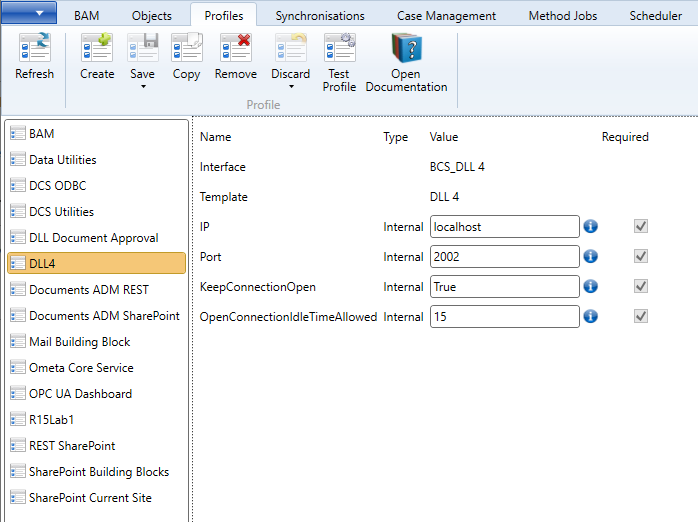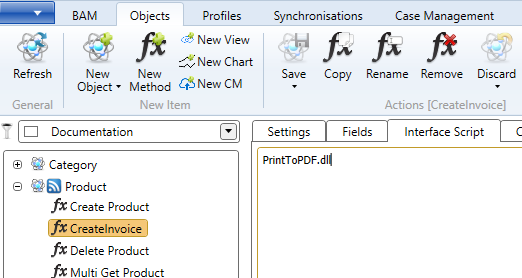DLL4 interface
Template and Profile

A template for the DLL4 interface contains the following parameters, it only has internal parameters:
| Field name | Type | Description |
|---|---|---|
| IP | Internal | Specifies the ip or hostname of the server on which the interface of this profile is installed. |
| Port | Internal | The port of the Ometa Business Connector Slave Listener (BCSL.exe; default: 2002). |
| KeepConnectionOpen | Internal | True or False. If True, connections made to this interface will stay open when the client disconnects. The next request for this interface with the same profile fields and values will reuse this open connection. Profile fields of the type Dynamic are ignored when this check happens. |
| OpenConnectionIdleTimeAllowed | Internal | Specifies the minutes a connection can stay open without a connected client. Only used if KeepConnectionOpen is True. |
External File
The external file of the DLL4 interface is the DLL file of an application. Simply place the file in the interface folder of the Ometa Business Connector. The interface folder is located in Ometa BVBA\Ometa Software Suite\TopDir\BC\Bin\Interfaces\BCS_DLL 4.
As you can see we have created a custom application called PrintToPDF. By placing the DLL file in the interface folder it is reachable by the DLL4 interface.
Next we have created a method called CreateInvoice in the Ometa Business Connector. The interface script of this method contains the filename.

Examples
Creating a Class Library in Visual Studio 2019
Important
The DLL4 interface only supports .NET Framework 4.8. It does NOT support .NET Core or .NET 5 and higher.
This example guides you through the steps to create a new Class Library.
Open Visual Studio.
Click on File > New > Project.
Select C# as language.
Select Windows as platform.
Select Class Library (.NET Framework).
Click on Next.
Important
Make sure to select Class Library (.NET Framework) as the project template. A very similar Class Library (.NET Standard) exists aswell. This second template will not work.
Implement IRequestProcessor
The next step is to write the code that the DLL4 interface should execute. This can be done by implementing Ometa.Interfaces.IRequestProcessor.
public class CreateInvoice : IRequestProcessor
{
public IInterfaceRequest Interface { get; set; }
public async Task ProcessRequestAsync(CancellationToken cancellationToken = default)
{
// Do something.
}
}
Statics
The default behavior of the DLL4 interface is to run the code in the same AppDomain. This means that static properties and fields are shared with other DLL methods running at the same time. The static values are kept until the DLL4 process is recycled.
We recommend using adequate locks, or using thread safe types (for example ConcurrentDictionary) to prevent concurrency issues.
Method Configuration
You can tell the DLL4 interface which code to call by putting the name of the dll file and the name of the class in the interface script.
Accessing the DLL of the Project
Once we have finished our custom application we need the DLL of our project.
- Go to the directory of the Visual Studio project you created.
- Go to \bin\Release.
- Copy the DLL file located there to the interface folder described in the above chapter External File.
NuGet Packages
The framework comes with NuGet packages that can be used in DLLs to access functionalities of the framework programmatically. The following packages are included:
| Package name | Description |
|---|---|
| Ometa.Framework.Client | The Ometa framework client library allows you to work with an Ometa framework installation. |
| Ometa.Framework.Core | The core library of the Ometa Framework. For internal use only. |
| Ometa.Framework.Core.Communication | Core project supporting internal communication via gRPC between Framework components. For internal use only. |
| Ometa.Framework.Core.OpcUa | Core project supporting the OPC UA protocol within the Ometa Framework. For internal use. |
| Ometa.Framework.Infra | The infra library of the Ometa Framework. For internal use only. |
| Ometa.Framework.Shared | Library containing enumerations and constants that are used in the other Ometa.Framework libraries. This NuGet will be automatically installed when installing the other Ometa.Framework NuGets because it's a dependency. |
| Ometa.Framework.Transfer | Library supporting of export, import and deployment of configuration between Ometa Framework installs. For internal use only. |
| Ometa.Libraries.Internal.All | This package contains all libraries and their required dependencies needed to work internally with the Ometa Framework (e.g.: via a custom dll) including the Ometa.CommLib, Ometa.DCS, Ometa.DCS.Utilities, Ometa.Data, Ometa.Data.Utilities and the Ometa.Utilities.Client. |
| Ometa.Libraries.Internal.CommLib | This package contains the Ometa.CommLib, Ometa.Data and the Ometa.Data.Utilities libraries and all their required dependencies. |